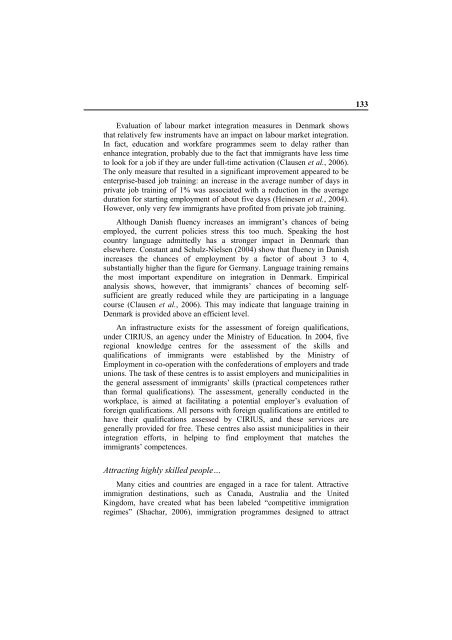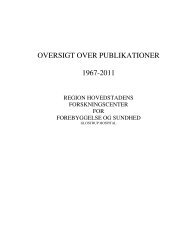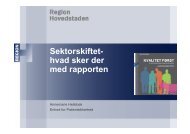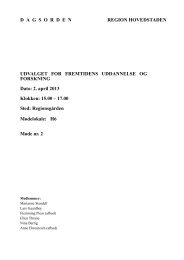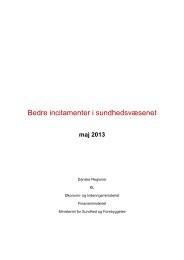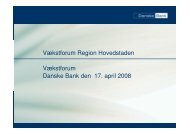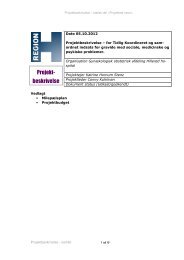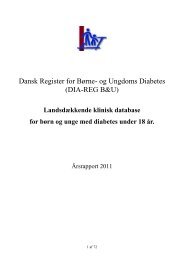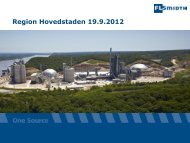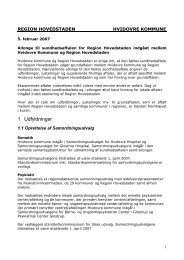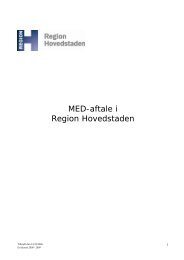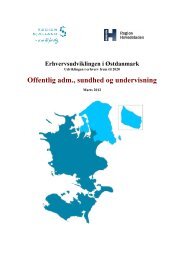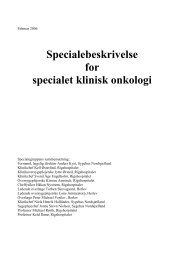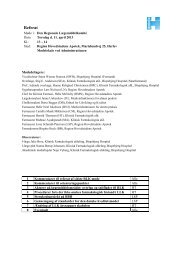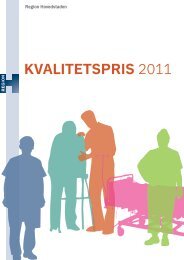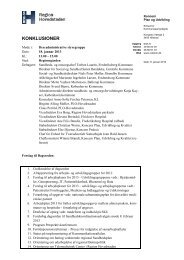Territorial Review Copenhagen - Region Hovedstaden
Territorial Review Copenhagen - Region Hovedstaden
Territorial Review Copenhagen - Region Hovedstaden
You also want an ePaper? Increase the reach of your titles
YUMPU automatically turns print PDFs into web optimized ePapers that Google loves.
133<br />
Evaluation of labour market integration measures in Denmark shows<br />
that relatively few instruments have an impact on labour market integration.<br />
In fact, education and workfare programmes seem to delay rather than<br />
enhance integration, probably due to the fact that immigrants have less time<br />
to look for a job if they are under full-time activation (Clausen et al., 2006).<br />
The only measure that resulted in a significant improvement appeared to be<br />
enterprise-based job training: an increase in the average number of days in<br />
private job training of 1% was associated with a reduction in the average<br />
duration for starting employment of about five days (Heinesen et al., 2004).<br />
However, only very few immigrants have profited from private job training.<br />
Although Danish fluency increases an immigrant‘s chances of being<br />
employed, the current policies stress this too much. Speaking the host<br />
country language admittedly has a stronger impact in Denmark than<br />
elsewhere. Constant and Schulz-Nielsen (2004) show that fluency in Danish<br />
increases the chances of employment by a factor of about 3 to 4,<br />
substantially higher than the figure for Germany. Language training remains<br />
the most important expenditure on integration in Denmark. Empirical<br />
analysis shows, however, that immigrants‘ chances of becoming selfsufficient<br />
are greatly reduced while they are participating in a language<br />
course (Clausen et al., 2006). This may indicate that language training in<br />
Denmark is provided above an efficient level.<br />
An infrastructure exists for the assessment of foreign qualifications,<br />
under CIRIUS, an agency under the Ministry of Education. In 2004, five<br />
regional knowledge centres for the assessment of the skills and<br />
qualifications of immigrants were established by the Ministry of<br />
Employment in co-operation with the confederations of employers and trade<br />
unions. The task of these centres is to assist employers and municipalities in<br />
the general assessment of immigrants‘ skills (practical competences rather<br />
than formal qualifications). The assessment, generally conducted in the<br />
workplace, is aimed at facilitating a potential employer‘s evaluation of<br />
foreign qualifications. All persons with foreign qualifications are entitled to<br />
have their qualifications assessed by CIRIUS, and these services are<br />
generally provided for free. These centres also assist municipalities in their<br />
integration efforts, in helping to find employment that matches the<br />
immigrants‘ competences.<br />
Attracting highly skilled people…<br />
Many cities and countries are engaged in a race for talent. Attractive<br />
immigration destinations, such as Canada, Australia and the United<br />
Kingdom, have created what has been labeled ―competitive immigration<br />
regimes‖ (Shachar, 2006), immigration programmes designed to attract


